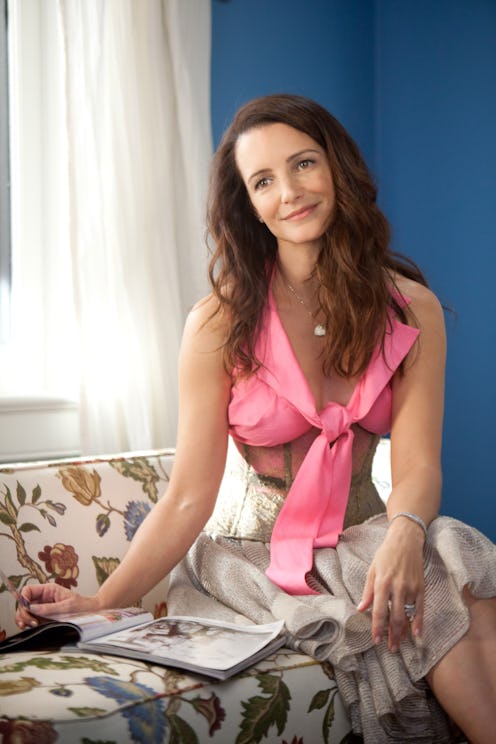(Living)
I Don't Think Soulmates Exist — Here's Why

Confession: For the better half of 32 years, I subscribed to a theory that soulmates existed and that there was one perfect human in the universe created just for me (and vice-versa). Maybe it was a direct result of my Disney-movie upbringing or the fact that my parents had been high school sweethearts and never loved another. Either way, I was that girl.
So you can imagine my disappointment and confusion when my 20s came and went, and all I had to show for it was a series of either wildly inappropriate partners or individuals who were perfectly lovely, but with whom I lacked that … spark. As Charlotte York so eloquently put it, “I've been dating since I was fifteen. I'm exhausted!” Same here, Charlotte. Same here.
“I think for most people, the concept of a ‘soulmate’ comes fully loaded with associated notions of perfect fit, destiny, and a permanent commingling of two lives (and two souls),” says Dr. Shauna Springer, a licensed psychologist with particular expertise in close relationships. “In other words, when someone expresses a belief in soulmates, this belief typically carries the hope that destiny will bring them into a permanent union with their ‘one perfect match.’”
For me, my belief in a destined romance made me think that the attraction and initial onslaught of butterflies and exhilaration meant I was potentially treading on soulmate territory. When things got challenging or any sort of conflict arose, I was quick to head for the hills and assume this meant this person was just not "the one." My partnerships lacked true depth and substance, because I saw those things as flaws or cracks in an otherwise destined masterpiece. This was clearly an unhealthy road I was on.
According to Dr. Springer, belief in “perfect matches” can be particularly problematic when combined with the broadly held view that “explosively positive” feelings are the mark of true love. “A person who becomes convinced that they have found their ‘soulmate’ is effectively telling him or herself, ‘It does not get better than this,’” she explains. “This can also become a problem during the transition from the initial phase of relationships — what I call the ‘cocaine rush’ phase … into the second phase, the ‘testing” phase.’”
During the “testing phase” Dr. Springer says she finds clients often struggle with thoughts like I thought he/she was my soul mate, but after that fight, I guess I was wrong. I’d better keep looking because I haven't found it yet. “If [you] buy into this thought, [you] may cut ties instead of learning to navigate the challenges that help partners actually become soulmates,” says Dr. Springer. In fact, she references research by Raymond Knee on the complications that can come with soulmates, which found that “people who believed that they had met their soulmates and who then encountered some information that contradicted their initial delusions often felt disillusioned, gave up the fight, and started detaching.”
So what’s the upside of this romantic disillusionment? As I approached my 30s, I found myself craving the opposite of what I thought I wanted for the past 15 years — solitude. I went on my first solo two-week excursion to Europe, and loved every second of it. While it didn’t happen overnight, I believe this trip planted a seed in my mind that flipped the script that once painted my singleness as a waiting room for something extraordinary and now painted it as a land of opportunity that was extraordinary in itself.
Another poignant moment that brought me to the current thought place I am in now came on a road trip I took with girlfriends (also around my 30th birthday). One of my newly married friends was fielding my rapid-fire questions on her first year of marriage, and she said something that will forever be embedded in my brain: “You know, I think a lot of people think marriage is all about sex and passion every night, but it’s actually about choosing someone every day, even when you don’t necessarily want to.” The key idea that will forever be ingrained in my brain here is choice. The idea of waking up and choosing someone every day and, in turn, having them choose me (despite my flaws) was the most refreshing thing I'd ever heard.
“While I do not believe there is such a thing as ‘finding your perfectly matched soulmate,’ I’ve seen plenty of evidence that we can become each other’s soulmates as a result of a deep and lasting love relationship,” says Dr. Springer. Navigating the darker, harder moments as well the light, bright, and easy ones and choosing your significant other through it all can truly bond you with someone and create true intimacy.
“Along these lines, for a couple in the later stages of a satisfying marriage, effective and respectful negotiation of challenges has become habitual,” explains Dr. Springer. “The partnership has become so multifaceted and the compatibilities so intricately dovetailed that one's spouse could never be replaced by anyone else. Two individuals who have become perfect for and irreplaceable to each other have become soulmates.”
Now, that’s romantic.